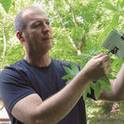| 2009 - Present | Director of Environmental Studies, Wright State University ‐ Wright State University | |
|
|
||
| 2008 - Present | Professor, Wright State University ‐ Biological Sciences | |
|
|
||
Disciplines
Research Interests
Grants
| 2016 - 2017 | Host versus alternate host tree oviposition attractants for female emerald ash borers |
| USDA-APHIS | |
| Colleague(s): Jim Tumlinson | |
| $123,000 | |
| 2015 - 2016 | Evaluating the risk posed by emerald ash borer to fringetrees, Chionanthus spp. |
| USDA-APHIS | |
| $44,000 | |
| 2014 - 2015 | Host tree oviposition attractants for female emerald ash borers |
| USDA-APHIS | |
| Colleague(s): Jim Tumlinson | |
| $103,000 | |
| 2013 - 2015 | MRI: Acquisition of Ion Torrent Personal Genome Machine to establish high-throughput sequencing capability for ecological and environmental biology |
| National Science Foundation | |
| Colleague(s): Oleg Paliy, Scott Daird, John Stireman, and Jeff Peters | |
| $123,300 | |
| 2013 - 2014 | Ameliorating soil legacy effects of an exotic plant invader: implications for forestry and restoration in Ohio |
| Ohio Plant Biotechnology Consortium | |
| Colleague(s): Ryan McEwan | |
| $9,541 |
Professional Service and Affiliations
| 2015 - Present | Associate Editor, Journal of Chemical Ecology | 2014 - Present | Board Chair, Pi Epsilon, the National Environmental Sciences Honor Society | 2008 - Present | Associate Editor, Environmental Entomology | Member, Ecological Society of America | Member, Entomological Society of America | Member, Sigma Xi, the Scientific Research Society |
Honors and Awards
- 2016 Finalist for Distinguished Professor of Research, Wright State University
- 2012 Finalist for Distinguished Professor of Research, Wright State University
| 1997 | PhD, Pennsylvania State University - Main Campus ‐ Ecology | |
|
|
||
| 1993 | M.S., Indiana University of Pennsylvania ‐ Biology | |
|
|
||
| 1990 | B.S., Indiana University of Pennsylvania ‐ Biology | |
|
|
||
Contact Information
Biological Sciences Bldg 203
3640 Colonel Glenn Hwy
Dayton, OH 45435-0001
(937) 775-3805
Email:
